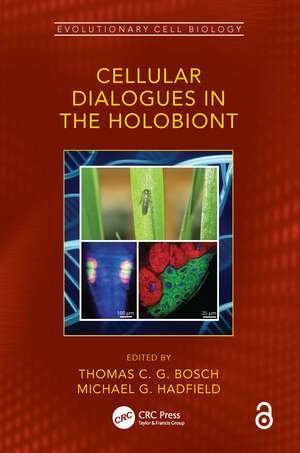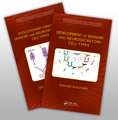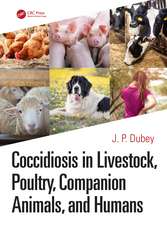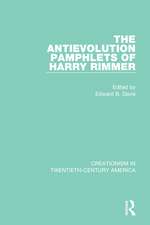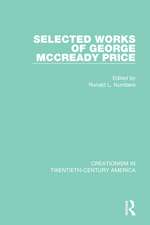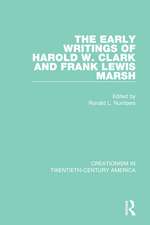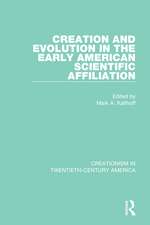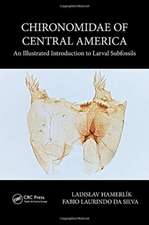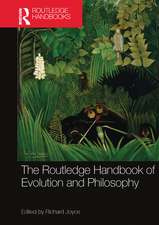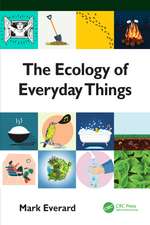Cellular Dialogues in the Holobiont: Evolutionary Cell Biology
Editat de Thomas C. G. Bosch, Michael G. Hadfielden Limba Engleză Hardback – 24 aug 2020
Key Features:
- Explores the nature of the interactions between eukaryotic hosts and their microbial symbionts
- Examines the links between prostist, animal, and plant evolution and microbial communities
- Reviews specific taxa and the microbial diversity associated with these taxa
- Illustrates the role microbes play in the physiology and etiology of several model species
- Includes chapters by an international team of leading scholars
Preț: 833.67 lei
Preț vechi: 916.11 lei
-9% Nou
Puncte Express: 1251
Preț estimativ în valută:
159.52€ • 166.57$ • 131.73£
159.52€ • 166.57$ • 131.73£
Carte disponibilă
Livrare economică 25 martie-08 aprilie
Livrare express 11-15 martie pentru 36.34 lei
Preluare comenzi: 021 569.72.76
Specificații
ISBN-13: 9780367228811
ISBN-10: 0367228815
Pagini: 314
Ilustrații: 2 Tables, black and white; 29 Illustrations, color; 15 Illustrations, black and white
Dimensiuni: 156 x 234 x 19 mm
Greutate: 0.62 kg
Ediția:1
Editura: CRC Press
Colecția CRC Press
Seria Evolutionary Cell Biology
ISBN-10: 0367228815
Pagini: 314
Ilustrații: 2 Tables, black and white; 29 Illustrations, color; 15 Illustrations, black and white
Dimensiuni: 156 x 234 x 19 mm
Greutate: 0.62 kg
Ediția:1
Editura: CRC Press
Colecția CRC Press
Seria Evolutionary Cell Biology
Cuprins
Series Preface
Preface
Editors
Contributors
Chapter 1 When does symbiosis begin? Bacterial cues necessary for metamorphosis in the marine polychaete Hydroides elegans - Marnie Freckelton and Brian T. Nedved
Chapter 2 The language of symbiosis: insights from protist biology - Morgan J. Colp and John M. Archibald
Chapter 3 Trichoplax and its bacteria: How many are there? Are they speaking? - Michael G. Hadfield and Margaret J. McFall-Ngai
Chapter 4 Decoding cellular dialogues between sponges, bacteria and phages - Lara Schmittmann, Martin T. Jahn, Lucía Pita and Ute Hentschel
Chapter 5 Symbiotic interactions in the holobiont Hydra - Jay Bathia and Thomas C.G. Bosch
Chapter 6 Hydra and Curvibacter - an intimate crosstalk at the epithelial interface - Timo Minten-Lange and Sebastian Fraune
Chapter 7 The coral holobiont highlights the dependence of cnidarian animal hosts on their
associated microbes - Claudia Pogoreutz, Christian R Voolstra, Nils Rädecker, Virginia Weis, Anny Cardenas and Jean-Baptiste Raina
Chapter 8 Extra-intestinal regulation of the gut microbiome: The case of C. elegans TGFβ/SMA signaling - Rebecca Choi, Dan Kim, Stacy Li, Meril Massot, Vivek Narayan, Samuel Slowinski, Hinrich Schulenburg and Michael Shapira
Chapter 9 Multiple roles of bacterially produced natural products in the bryozoan Bugula neritina - Nicole B. Lopanik
Chapter 10 The molecular dialogue through ontogeny between a squid host and its luminous symbiont - Margaret J. McFall-Ngai
Chapter 11 Evolving integrated multipartite symbioses between plant-sap feeding insects (Hemiptera) and their endosymbionts - Gordon Bennett
Chapter 12 Symbiosis for insect cuticle formation - Hisashi Anbutsu and Takema Fukatsu
Chapter 13 Microbial determinants of folivory in insects - Aileen Berasategui and Hassan Salem
Chapter 14 Right on cue: microbiota promote plasticity of zebrafish digestive tract - Michelle S. Massaquoi and Karen J. Guillemin
Chapter 15 Uncovering the history of intestinal host-microbiome interactions through vertebrate comparative genomics - Colin R. Lickwar and John F. Rawls
Chapter 16 Molecular interactions of microbes and the plant phyllosphere: The phyllosphere microbiome is shaped by the interplay of secreted microbial molecules and the plant immune system - Janine Haueisen, Cecile Lorrain and Eva H. Stukenbrock
Chapter 17 Summing up: Cellular dialogues between hosts and microbial symbionts: generalities emerging - Michael C. G. Hadfield and Thomas G. Bosch
Preface
Editors
Contributors
Chapter 1 When does symbiosis begin? Bacterial cues necessary for metamorphosis in the marine polychaete Hydroides elegans - Marnie Freckelton and Brian T. Nedved
Chapter 2 The language of symbiosis: insights from protist biology - Morgan J. Colp and John M. Archibald
Chapter 3 Trichoplax and its bacteria: How many are there? Are they speaking? - Michael G. Hadfield and Margaret J. McFall-Ngai
Chapter 4 Decoding cellular dialogues between sponges, bacteria and phages - Lara Schmittmann, Martin T. Jahn, Lucía Pita and Ute Hentschel
Chapter 5 Symbiotic interactions in the holobiont Hydra - Jay Bathia and Thomas C.G. Bosch
Chapter 6 Hydra and Curvibacter - an intimate crosstalk at the epithelial interface - Timo Minten-Lange and Sebastian Fraune
Chapter 7 The coral holobiont highlights the dependence of cnidarian animal hosts on their
associated microbes - Claudia Pogoreutz, Christian R Voolstra, Nils Rädecker, Virginia Weis, Anny Cardenas and Jean-Baptiste Raina
Chapter 8 Extra-intestinal regulation of the gut microbiome: The case of C. elegans TGFβ/SMA signaling - Rebecca Choi, Dan Kim, Stacy Li, Meril Massot, Vivek Narayan, Samuel Slowinski, Hinrich Schulenburg and Michael Shapira
Chapter 9 Multiple roles of bacterially produced natural products in the bryozoan Bugula neritina - Nicole B. Lopanik
Chapter 10 The molecular dialogue through ontogeny between a squid host and its luminous symbiont - Margaret J. McFall-Ngai
Chapter 11 Evolving integrated multipartite symbioses between plant-sap feeding insects (Hemiptera) and their endosymbionts - Gordon Bennett
Chapter 12 Symbiosis for insect cuticle formation - Hisashi Anbutsu and Takema Fukatsu
Chapter 13 Microbial determinants of folivory in insects - Aileen Berasategui and Hassan Salem
Chapter 14 Right on cue: microbiota promote plasticity of zebrafish digestive tract - Michelle S. Massaquoi and Karen J. Guillemin
Chapter 15 Uncovering the history of intestinal host-microbiome interactions through vertebrate comparative genomics - Colin R. Lickwar and John F. Rawls
Chapter 16 Molecular interactions of microbes and the plant phyllosphere: The phyllosphere microbiome is shaped by the interplay of secreted microbial molecules and the plant immune system - Janine Haueisen, Cecile Lorrain and Eva H. Stukenbrock
Chapter 17 Summing up: Cellular dialogues between hosts and microbial symbionts: generalities emerging - Michael C. G. Hadfield and Thomas G. Bosch
Recenzii
"This book describes the cell biology of the 21st century, where nutrition, immunity, and development are the efforts of a multispecies team that function together as an "individual." There is currently no better place to find the new paths that are leading to an exciting and more ecological perspective on cells and their evolution." Scott Gilbert (Swarthmore College)
Notă biografică
Thomas C. G. Bosch studied Biology at the Univboschersity of Munich and Swansea University College in the UK from 1976 to 1983. He earned his doctorate from the University of Munich in 1986. From 1986 to 1988, Bosch held a postdoctoral position at the University of California, Irvine, USA. After a position as research associate at the University of Munich, he was appointed to professorship for Zoology at the Friedrich Schiller University of Jena in 1997. Since 2000 Bosch is Professor of General Zoology at Kiel University. Bosch is Senior Fellow of the Canadian Institute of Advanced Research (CIFAR). From 2010 to 2013 he served as Vice-President of Kiel University and was responsible for Kiel University’s institutional strategy and international relations. Since November 2013 Bosch is heading the interdisciplinary research center "Kiel Life Science" (KLS) at Kiel University. Bosch is spokesperson of the Collaborative Research Center (CRC/SFB 1182) "Origin and Function of Metaorganisms" (2016-2019) which addresses the relatively newly recognized role of multi-organismic interactions for health and disease. Bosch also is Editor-in-Chief of "Zoology". He currently (2016/2017) is President of the German Society of Developmental Biology (GfE) and a member of several national and international Academic Committees and Boards. He is Senior Fellow of the Canadian Institute for Advanced Research (CIFAR) and fellow of the Wissenschaftskolleg zu Berlin. His awards include a Dr. honoris causa degree from St. Petersburg State University, Russia (2004).
Michael G. Hadfield received B.A. and M.S. degrees in Zoology from the University of Washington and then spent a year as a Fulbright Fellow studying larval biology at the Marine Biological Laboratory of the University of Copenhagen. He received a Ph.D. in Biological Sciences at Stanford University presenting a dissertation on the reproduction and development of marine gastropods, a study that involved field research, laboratory observations and experiments, and electron microscopy. After spending two years teaching at Pomona College in southern California, he joined the faculty at the Kewalo Marine Laboratory of the University of Hawaii. His research has focused on development of marine invertebrate animals, especially the complex processes of larval metamorphosis and the factors that stimulate metamorphosis. For the last 20 years, these studies have increasingly focused on the mechanisms by which specific biofilm bacterial species stimulate larval settlement and metamorphosis and the larval responses to those stimuli. Now Professor of Biology Emeritus, he continues to direct an active research group at the Kewalo Marine Lab of the Pacific Biosciences Research Center. He has trained 10 M.S. and 21 Ph.D. students and a large number of postdoctoral fellows. He has also served since 1999 as director of an undergraduate research-mentoring program for Hawaiian and Pacific Island students, with support for the National Science Foundation. In addition to his research interests in the development of marine invertebrate animals, Dr. Hadfield has maintained a separate research program focused on the evolutionary biology and conservation of endangered Hawaiian and Marianas Islands tree snails. Dr. Hadfield has served as Director of the Kewalo Marine Lab, Chair of the Hawaii Natural Areas Reserves Commission, President of the Society for Integrative and Comparative Biology and the Western Society of Naturalists, and is a Fellow of the American Association for the Advancement of Science. Research in the Hadfield lab has been supported by grants from the National Science Foundation, the Office of Naval Research, the Oak Foundation, the Gordon and Betty Moore Foundation, and the Defense Advanced Research Projects Agency (DARPA) in the last decade.
Michael G. Hadfield received B.A. and M.S. degrees in Zoology from the University of Washington and then spent a year as a Fulbright Fellow studying larval biology at the Marine Biological Laboratory of the University of Copenhagen. He received a Ph.D. in Biological Sciences at Stanford University presenting a dissertation on the reproduction and development of marine gastropods, a study that involved field research, laboratory observations and experiments, and electron microscopy. After spending two years teaching at Pomona College in southern California, he joined the faculty at the Kewalo Marine Laboratory of the University of Hawaii. His research has focused on development of marine invertebrate animals, especially the complex processes of larval metamorphosis and the factors that stimulate metamorphosis. For the last 20 years, these studies have increasingly focused on the mechanisms by which specific biofilm bacterial species stimulate larval settlement and metamorphosis and the larval responses to those stimuli. Now Professor of Biology Emeritus, he continues to direct an active research group at the Kewalo Marine Lab of the Pacific Biosciences Research Center. He has trained 10 M.S. and 21 Ph.D. students and a large number of postdoctoral fellows. He has also served since 1999 as director of an undergraduate research-mentoring program for Hawaiian and Pacific Island students, with support for the National Science Foundation. In addition to his research interests in the development of marine invertebrate animals, Dr. Hadfield has maintained a separate research program focused on the evolutionary biology and conservation of endangered Hawaiian and Marianas Islands tree snails. Dr. Hadfield has served as Director of the Kewalo Marine Lab, Chair of the Hawaii Natural Areas Reserves Commission, President of the Society for Integrative and Comparative Biology and the Western Society of Naturalists, and is a Fellow of the American Association for the Advancement of Science. Research in the Hadfield lab has been supported by grants from the National Science Foundation, the Office of Naval Research, the Oak Foundation, the Gordon and Betty Moore Foundation, and the Defense Advanced Research Projects Agency (DARPA) in the last decade.
Descriere
This book examines protist-, animal- or plant-bacterial interactions and symbioses. These symbioses rely on continuous cell-to-cell communications. The goals of this book are to explore, explain and expose these dialogues across a broad spectrum of plant and animal eukaryotes to a broad field of biologists.
